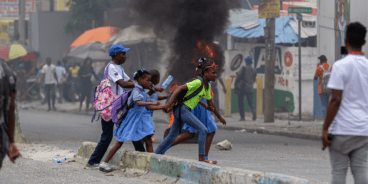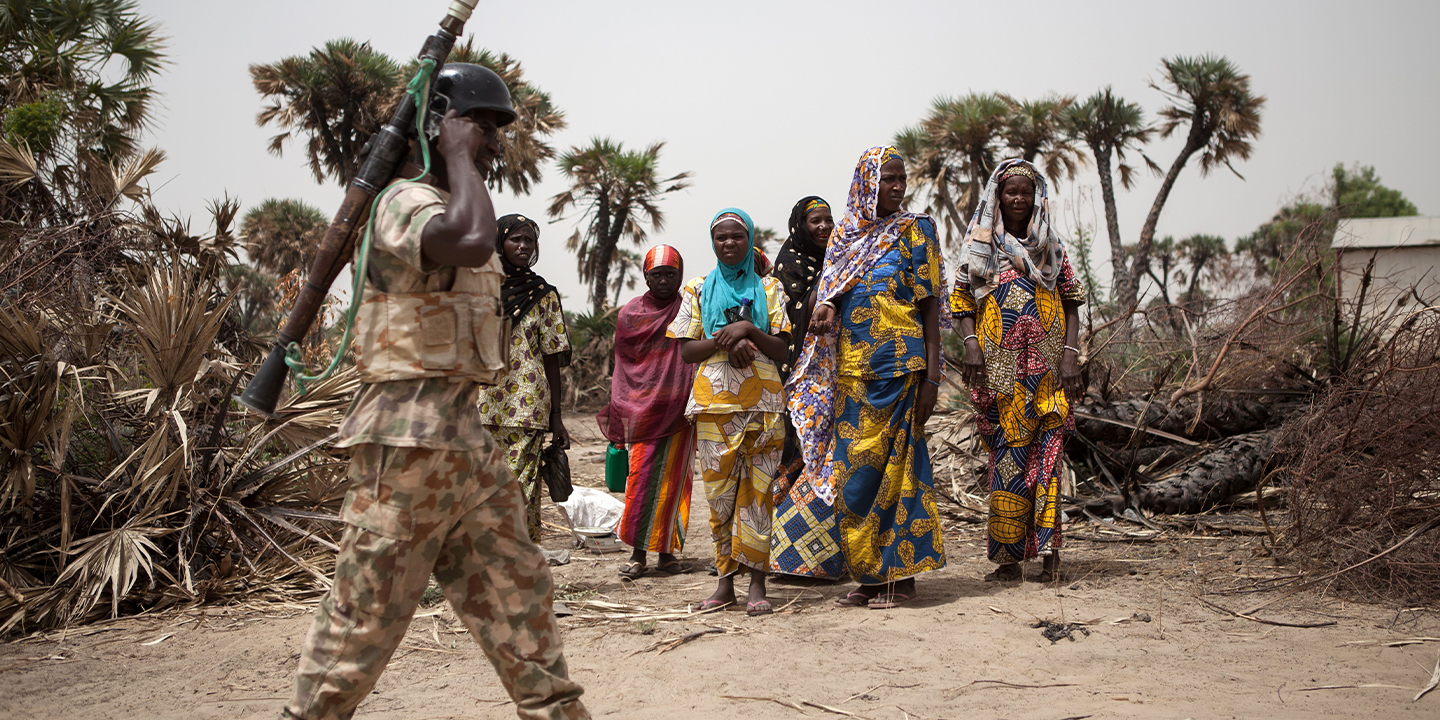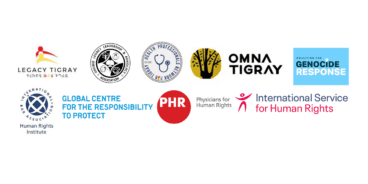

Atrocity Alert No. 329: Nigeria, Myanmar (Burma) and Ethiopia
Atrocity Alert is a weekly publication by the Global Centre for the Responsibility to Protect highlighting situations where populations are at risk of, or are enduring, mass atrocity crimes.
NIGERIAN ARMY ACCUSED OF RUNNING ILLEGAL FORCED ABORTION PROGRAM
The Nigerian military has allegedly run a secret, systematic and illegal abortion program in the northeastern states of Adamawa, Borno and Yobe that has terminated at least 10,000 pregnancies since 2013, according to an investigation by Reuters. Many of the women and girls had been kidnapped, forcibly married, beaten and repeatedly raped by the armed extremist group Boko Haram. After being rescued by Nigerian security forces, the women and girls were kept in military custody for days or weeks, where they received pills and injections – under false pretenses – leading to abortions without consent or prior knowledge. According to accounts from soldiers, they received orders from direct superiors on how to run the clandestine program.
Since 2009 Boko Haram has pursued a violent campaign aimed at overthrowing Nigeria’s secular government and establishing an Islamic state. More than 35,000 people have been killed in northern Nigeria since the beginning of the insurgency and there are at least 1.8 million people internally displaced in Adamawa, Borno and Yobe states.
The alleged forced abortion program adds to a growing body of evidence of potential crimes perpetrated by the Nigerian government while attempting to combat Boko Haram. Not only has the military been unable to effectively protect civilians, it has also been implicated in potential atrocity crimes, including alleged torture, rape and extrajudicial killings of civilians and suspected members of the armed group. In December 2020 the Office of the Prosecutor of the International Criminal Court (ICC) closed its preliminary examination in Nigeria, concluding that there is a reasonable basis to believe that Boko Haram and the military have committed war crimes and crimes against humanity.
Although the Rome Statute of the ICC does not explicitly criminalize forced abortion, “rape, sexual slavery, enforced prostitution, forced pregnancy, enforced sterilization, or any other form of sexual violence of comparable gravity” or “other inhumane acts […] intentionally causing great suffering, or serious injury to body or to mental or physical health” amount to war crimes and/or crimes against humanity. Furthermore, the UN Special Rapporteur on the right of everyone to the enjoyment of the highest attainable standard of physical and mental health stated in 2011 that “the use of overt physical coercion by the State or non-State actors, such as in cases of forced sterilization, forced abortion, forced contraception and forced pregnancy has long been recognized as an unjustifiable form of State-sanctioned coercion and a violation of the right to health.”
Juliette Paauwe, Nigeria expert at the Global Centre for the Responsibility to Protect, said, “The Nigerian military must immediately halt the illicit abortion program, ensure the safety and security of women and girls rescued from armed extremist groups and provide the necessary medical and psychosocial support. After two years of inaction on the situation in Nigeria, the Prosecutor of the ICC should immediately request authorization to open an investigation into all alleged crimes.”
MYANMAR MILITARY ESCALATES USE OF ARSON ATTACKS AS A WEAPON OF WAR
On 8 December Myanmar’s (Burma) military and members of the pro-military Pyu Saw Htee militia group burned down nearly 150 civilian houses in an attack on Eai Dine village of Kyun Hla Township in Sagaing Region. Members of the military – also known as the Tatmadaw – and the allied militia fired artillery and raided the village, forcing thousands of civilians to flee. Residents reported that about half of the village was burned in the attack and have indicated fear of returning in case soldiers planted landmines.
The recent attack in Eai Dine demonstrates the military’s continued and growing reliance on arson as a tactic of war and means for maintaining its hold on power. The Tatmadaw burned down over 38,400 houses across the country between the February 2021 coup and August 2022, according to the research group Data for Myanmar. The resistance stronghold of Sagaing Region has been hit the hardest, with around 20,150 houses torched by junta forces. The research group Myanmar Witness recorded 71 fire incidents in November 2022, more than any month since September 2021, with the majority of attacks concentrated in Sagaing Region. The military’s widespread use of arson throughout the country likely constitutes war crimes and crimes against humanity.
Meanwhile, since the Tatmadaw reached a temporary ceasefire with the Arakan Army (AA) at the end of November, the military has seemingly shifted its attention from Rakhine State to Shan and Kachin states in northeast Myanmar. Shan State is home to the armed resistance group the Ta’ang National Liberation Army (TNLA), which, along with the AA and the Myanmar National Democratic Alliance Army comprise the anti-junta Three Brotherhood Alliance. Clashes between the TNLA and the Tatmadaw have reportedly escalated in Namhsan Township, Shan State, and have forced residents of Man Long village to flee.
Liam Scott, Myanmar expert at the Global Centre for the Responsibility to Protect, said, “It is long past time for the international community to uphold its Responsibility to Protect Myanmar’s populations from atrocity crimes. The military’s continued use of arson and airstrikes underscores the dire need for enhanced international action, including by blocking the flow of weapons and aviation fuel into Myanmar.”
HUNDREDS KILLED IN ARMED ATTACKS AND MASSACRES IN ETHIOPIA’S OROMIA REGION
On 7 December the Ethiopian Human Rights Commission released a report detailing widespread abuses on civilian populations in 16 zones of the Oromia region. The report found that hundreds of civilians have been killed and at least 100,000 displaced over the last five months amidst fighting between different configurations of armed groups, including the Oromo Liberation army (OLA) – an ethnic Oromo armed group – and ethnic Amhara “Fano” militias, with federal and Oromia regional security forces. In some rural areas, villages and towns have been partially or completely destroyed. The report determined that government forces were responsible for air strikes on civilian areas and extrajudicial killings of civilians perceived to be supportive of armed groups. Armed groups also targeted populations on the basis of their ethnicity.
The report was released after accounts emerged of new massacres in the Oromia region. This includes an attack that residents attributed to Fano militias from 25-29 November in Kiremu district in East Wollega Zone, which left dozens dead and displaced approximately 350,000 people. Additional attacks allegedly took place in the same area from 3-4 December. Earlier this year, at least 400 Amhara civilians were killed on 18 June in Tole Kebele, West Wollega Zone. Government forces and the OLA denied responsibility and traded blame for the massacre. From 29-31 August at least 60 people were killed in ethnic-based attacks and reprisals between ethnic Amhara and Oromo around the town of Obora.
Reports of abuses by government and regional security forces and the OLA date back to 2019 when the government began to battle the OLA’s insurgency in western and southern Oromia. Government forces have been accused of summary executions and arbitrary arrests of Oromos while the OLA has allegedly targeted government officials and Amhara communities, killing hundreds and causing mass displacement. The targeting of civilians based on their identity, as well as extrajudicial executions and arbitrary detentions, may amount to crimes against humanity.
In attempt to resolve the multidimensional conflicts and alleviate ethnic tensions across the country, a national dialogue process began in February 2022, however, the dialogue does not currently include the OLA. The Global Centre for the Responsibility to Protect’s Ethiopia expert, Sarah Hunter, said, “In order to holistically address the conflicts in Oromia and other regions of the country, the Ethiopian government must engage all actors in the pursuit of peace. Victims of atrocities committed by the government and armed groups alike need comprehensive and transparent investigations and justice, as well as humanitarian assistance.”
Related Content


